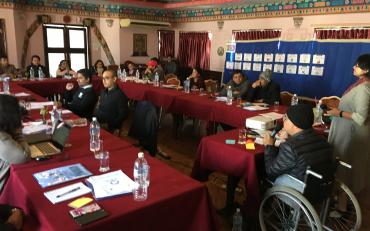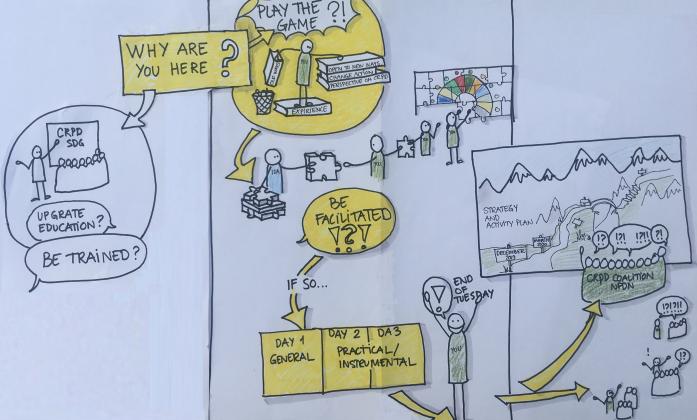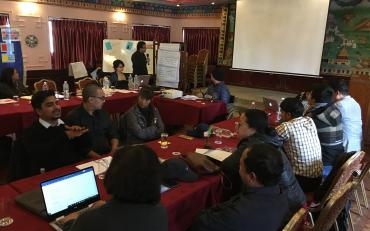From 24 to 26 November, the Danish Disabled People’s Organisation (DPOD) and the International Disability Alliance (IDA) are hosting the Workshop on linkages between the CRPD and the SDGs implementation and monitoring to Nepali DPOs.
The workshop is held in Kathmandu, Nepal, and attended by representatives of the National Federation of the Disabled (NFDN) and DPOD partners from different parts of Nepal. The workshop includes both women and men with deafblindness and deaf people, among others.
Tools of inclusion, evaluation and review from the Bridge CRPD-SDGs Initiative were used, such as the traffic cards, the parking slot, sensory breaks and the daily review team.
During the three days intensive programme, participants are being exposed to deeper discussions on the CRPD, intersectionality, disability inclusiveness in the SDGs and strategies for taking forward recommendations from UN mechanisms, such as the Committee on the Rights of Persons with Disabilities (CRPD Cttee). Participants also will be engaged in analyses of the Nepali Disability Act from the CRPD perspective and on details on the Voluntary National Review (VNR) and the Universal Periodic Review (UPR) UN processes.
The workshop is supported by Renu Lohani and Anne Sophie Fabricius, both from DPOD, as resource persons and co-facilitated by Pratima Gurung, Asian representative of the Indigenous Persons with Disabilities Global Network, Amba Salelkar, Bridge Regional Fellow and TCI Asia-Pacific member, and Tchaurea Fleury, Bridge CRPD-SDGs Coordinator.


Summaries
First day
The first day of the training began with the welcoming remarks by Mitra Lal Sharma, Federal President of NFDN, and was followed by an introduction by Anne Sophie Fabricius, senior advisor at DPOD. She used her own unique method of graphic facilitation to explain the approach of the training and the outcomes which were anticipated from the three days.
After a round of presentation of participants, interpreters, support people and the facilitation team, the house rules were identified for the training, which reflected their commitment to ensuring full participation of all participants and facilitators.
Participants were then asked to reflect on their expectations for the training, which were mainly:
- Understand the linkages between the CRPD and SDGs,
- Get familiar with the CRPD concluding observations,
- Better understand about invisible impairments and intersectionality, and
- Linkages and good practices of international community on the CRPD implementation.
The following session was dedicated to the Principles of the CRPD. The facilitator started by opening up discussions on the CRPD with a round of questions soliciting the experience of the participants in the room who had been engaged with:
- The CRPD parallel reporting processes,
- The passage of the Nepal Disability Law, and
- The SDGs parallel reporting processes
Before tackling the discussion around the SDGs and other UN treaty bodies, the first exercise focused on the General Principles of the CRPD. Teams were split into four groups, and they were expected to present the core elements of two general principles each.
The groups were deeply engaged in discussions which spilled over the lunch break, and two teams presented their reflections on the general principles relating to
- Respect for inherent dignity, individual autonomy including the freedom to make one’s own choices, and independence of persons;
- Non-discrimination
- Respect for difference and acceptance of persons with disabilities as part of human diversity and humanity;
- Accessibility
The groups received an in-depth feedback from the facilitator, based on the CRPD Committee jurisprudence, which also engaged in an interactive discussion with the plenary. It was emphasized that the principles should be considered in relation to each article of the Convention, be it on education, employment, political participation, or social protection.
The day ended at 15:30 to enable the NFDN Office Bearers to attend to the visit of the newly appointed Minister of the disability focal ministry to the NFDN Headquarters.
The day was evaluated by the daily review team as very positive, inclusive and different from previous trainings, encouraging to the active participation. Also, participants and facilitation team appreciated that main leaders of the Nepali movement and other participants were involved in an equal footing. As points to be improved, participants requested the facilitators to be stricter regarding the side conversation, and to request some leaders that continuously take the floor to leave more space to participants that have been less exposed to this kind of training.
Participants List DPOD IDA Workshop (English, doc, 106.5 KB)

